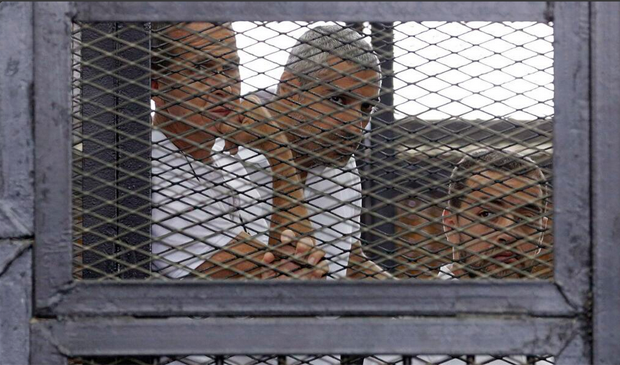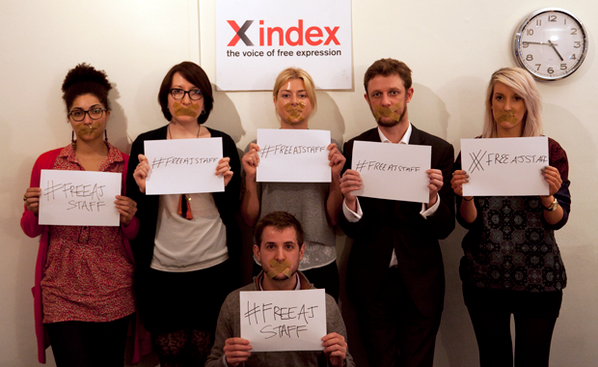Index relies entirely on the support of donors and readers to do its work.
Help us keep amplifying censored voices today.
The usually bustling entrance of the New Broadcasting House in London was still filled to the brim with people this morning, but for one minute they were completely silent.
BBC staff, joined by fellow journalists from around the world, stood in silent protest at 9:41 am, exactly 24 hours from the sentencing of three Al Jazeera journalists to prison in Egypt. Peter Greste and Mohamed Fahmy were each handed down seven-year sentences, while Baher Mohamed was given ten years.
The three journalists were found guilty on Monday for spreading false news by a court in Cairo. Ten other journalists, including Al Jazeera’s Sue Turton and Dominic Kane, and Rena Netjes, a correspondent for Dutch newspaper Parool, were also sentenced in absentia to ten years.
The silent protest was orchestrated in hopes of fighting against these unjust practices and to raise awareness of the dangers and censorship many international journalists face.
BBC Director of News, James Harding, stood up and addressed the group: “They are not just robbing three innocent men of their freedom, but intimidating journalists and inhibiting free speech.”
The protestors held signs that read #FreeJournalism and #FreeAJStaff, and covered their mouths with tape in order to illustrate their frustration with the trial verdict.
Sana Safi, a presenter for BBC Pashto TV News, said: “When I heard the verdict, I was in shock because I’m from Afghanistan and we have seen more media freedom in the last few years, and I wasn’t expecting anything like that from a country like Egypt.”
Their looks were determined and their heads were held high as cameras flashed and captured the intense moment. Cowardice was not an option.
Nasidi Yahaya, a social media producer from BBC Hausa, said: “The verdict was so unfair, these guys were just doing their job. Journalists should not be silenced like this.”
The journalists from the BBC, Al Jazeera, and other news organisations standing together in solidarity will also be sending a letter calling on the Egyptian president to intervene in the situation.
The wait for their freedom begins.
This article was posted on 24 June, 2014 at indexoncensorship.org

The sentencing of Al Jazeera journalists today took Michelle Betz back to her own trial.
Just over a year ago I was awoken around 5am in Washington by a call from my Egyptian colleague. “Guilty,” he breathed. “We are all guilty”. I could hear the shock in his voice. I couldn’t yet feel my own shock.
We were defendants in the NGO trial in which 43 people working for four US and one German NGOs were accused of charges including operating without a licence and bringing foreign funds into the country. There were so many ironies about the case, the trial, and the charges; so many outrages; so many injustices. There were many, many parallels with what is happening now with the Al Jazeera journalists.
There was little international noise around our “trial”. And that is the one thing that has been different with the Al Jazeera trial – at least there has been no silence.
At the time I was working with the International Center for Journalists, from Washington DC. Judicial officials didn’t even have my full name, but there I was number 39 on the charge document.
I knew full well one year ago that we would be found guilty despite the multitude of assurances from all corners: the NGOs, the US State Department, the lawyers – all tried to assure us that this was all political (between the US and Egypt) and that this would “all go away”. Of course, logically, this should have all gone away. Just as with the Al Jazeera case, logically, it never should have happened. Logically, we, as they, should have been found innocent.
But dealing with the Egyptian judicial system is anything but logical.
In neither case was there any evidence and in neither trial did the prosecution have any legitimate case. But that was beside the point. They didn’t need evidence. They didn’t need a case. All they needed to do was follow the directive from on high and read the verdict: guilty.
I lived in Egypt for three years and I can never go back. If I did I would be immediately imprisoned.
Some have expressed surprise at the speed with which today’s verdict was rendered asking how the judge could possibly have written his judgment in so short a time. He didn’t. Instead, it’s highly likely that the judgment was already written six months ago. The judge was simply doing what he was told. I too would have worn sunglasses to court today; I too would have dragged my feet getting to work for surely there was some weight on his conscience.
So what now? The Egyptians learned from our case. At least in the NGO case none of us were imprisoned, though Egypt did pursue some of us through Interpol. The one thing the US did was to get all Americans (save one hero, Robert Becker, who refused to leave his Egyptian colleagues facing trial alone) first to the US Embassy in Cairo (where they stayed for days) and then finally flew them out in the middle of the night after some backroom deal was worked out with Egyptian officials.
And the Egyptian establishment has learned from this. They learned not to allow bail to prevent defendants leaving Egypt. They learned that the US (and the international community at large) didn’t care and that there would be no repercussions even if American citizens were convicted and sentenced to five years of hard labor. They learned that even the media didn’t care.
But on that last point they miscalculated – they didn’t realise that there is a tribe of journalism, which does not suffer injustice and attacks on its own. And that is our hope at this point – that we raise our voices, we continue to speak the truth, we continue to point to injustices, including injustices wrought on our tribe. For if we are silenced, then we all face injustice.
Yes, of course there was no evidence and of course the prosecution had no case. And so today we find ourselves one year on watching in horror as three Al Jazeera journalists are convicted and sentenced to 7-10 year prison sentences and those convicted in absentia to an even lengthier sentence (just like those convicted in absentia in the NGO trial, such as myself, who received longer sentences).
And so while my colleagues were shocked by our verdict one year ago, I was not. And if we were found guilty then so too would our Al Jazeera colleagues. There was a message to be sent.
But the convictions should be no surprise. Rule of law in Egypt as always been tough to find but almost any remaining semblance of it disappeared with the coup of 2013.
This article was posted on June 23, 2014 at indexoncensorship.org
On the eve of World Press Freedom Day, Index on Censorship’s Melody Patry speaks to Al Jazeera about the threats to freedom of expression online.
 Peter Greste and his colleagues Mohammed Fahmy and Baher Mohamed have been imprisoned in Egypt since 29 December 2013. They are now on trial facing charges related to terrorism, along with six other journalists being tried in absentia. They are among many local Egyptian journalists and media workers who have been detained by the Egyptian authorities.
Peter Greste and his colleagues Mohammed Fahmy and Baher Mohamed have been imprisoned in Egypt since 29 December 2013. They are now on trial facing charges related to terrorism, along with six other journalists being tried in absentia. They are among many local Egyptian journalists and media workers who have been detained by the Egyptian authorities.Please join the world’s press in a Global Day of Action on Thursday 27 February with peaceful demonstrations, silent protests and individual images to demand their release. Send a message to Egypt and the world: if you silence the press, you silence us all.What we can do in the UK:In London – supporters are to meet at Trafalgar Square at midday on 27 February – taping their mouths closed in solidarity.
Across the UK – newsrooms, offices, shops, commuters, tourists – are asked to stop at midday and cover their mouths with whatever is at hand, take a selfie and post it online using the hashtag #FreeAJStaff.
Please sign the Petition, pass the message on and join this Global Day of Action in any way you can:
http://www.thepetitionsite.com/583/945/591/freeajstaff-release-detained-al-jazeera-journalists/